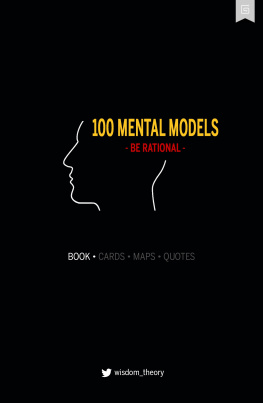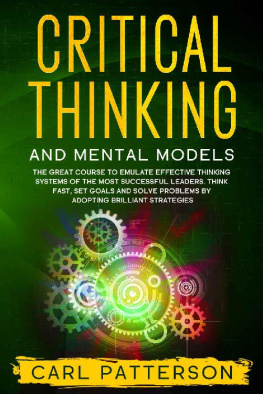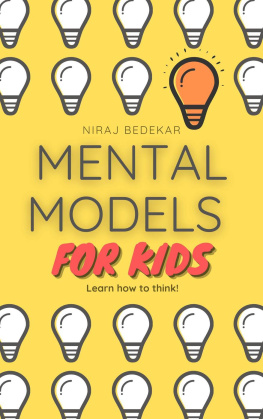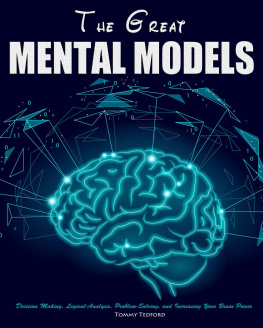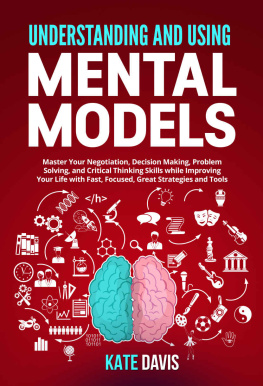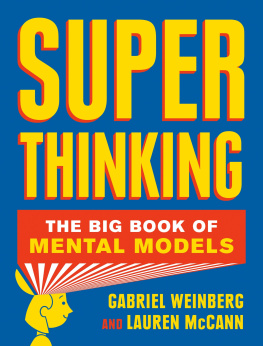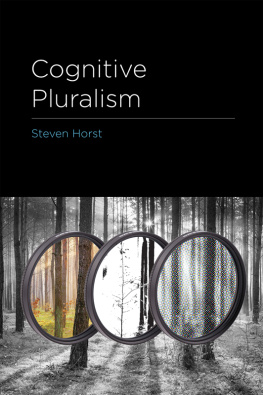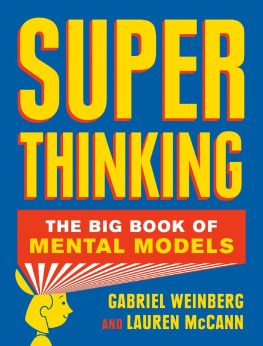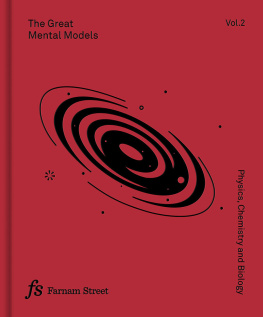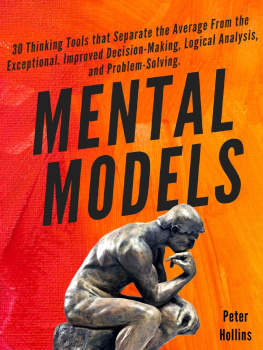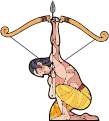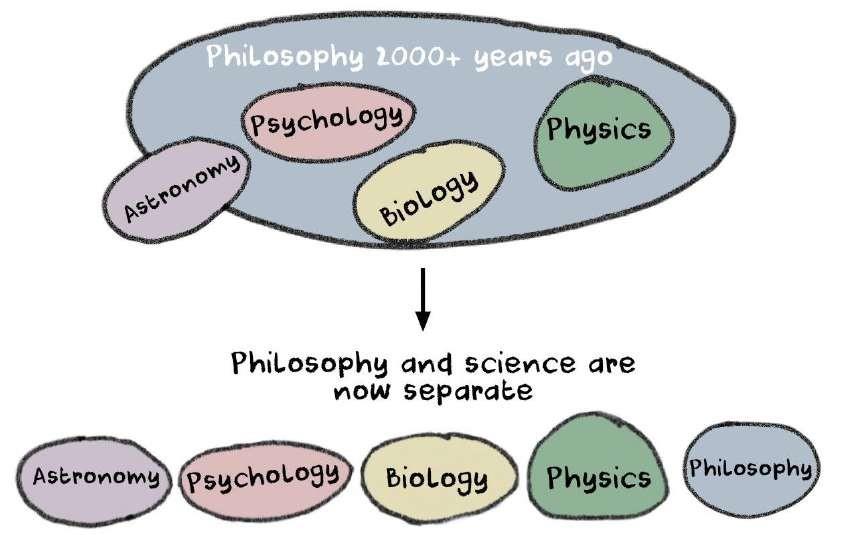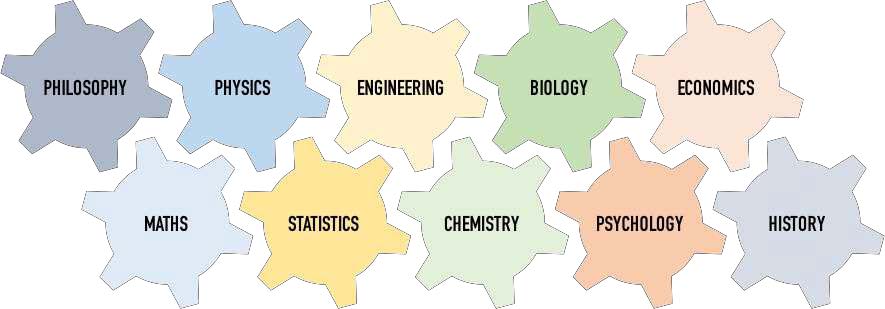| Wisdom Theory - 100 Mental Models (2020) |
| Wisdom Theory |
| Vibhatsu (Sep 2022) |
|
| Tags: | Mental, Models, Wisdom, Quotations |
| Mentalttt Modelsttt Wisdomttt Quotationsttt |
HOW TO THINK BETTER
The world is complex and interconnected, and we need to understand the big ideas from big disciplines, in order to have a whole map of the reality to be able to make better decisions.
Critical thinking has to be based on going to the fundamental ideas, to the mental models.
Mental models are the most important ideas of each science: philosophy, mathematics, physics, statistics, engineering, chemistry, biology, psychology, economics and history.
You need to know and connect them.
The book explains 100 mental models to make better decisions and think critically.
Here are some examples of how mental models will improve your life:
- Do you want to create a successful business?
Leverage, Niches and Scale models will guide you. - Do you want to be happy, achieve more and suffer less?
Stoicism, Anti-fragility and Resilience give you the vision and strength you need. - Do you want to know why you shouldnt believe what you see on Instagram?
Platos Cave metaphor will give you the answer. - Do you want to boost your professional career?
Take a look at the Incentives mental model. - Do you want to make rational decisions?
The 25 biases that Charlie Munger details in Psychology of Human Misjudgment will help you.
This program is for people who want to thinking in a multidisciplinary way.
Title Page
100
Mental Models
be rational
Wisdom Theory
This ePUB is
compiled & gifted to book-lovers by
Vibhatsu
Dedication
to
Charles T. Munger
Epigraph
You have to learn all the big ideas in the key disciplines in a way that theyre in a mental latticework in your head and you automatically use them for the rest of your life. If you do that, I solemnly promise you that one day youll be walking down the street and youll look to your right and left and youll think my heavenly days, Im now one of the few competent people in my whole age cohort. If you dont do it, many of the brightest of you will live in the middle ranks or in the shallows.
Charlie Munger
Content
Introduction
If all you have is a hammer, everything looks like a nail.
Abraham Maslow
E volution has rewarded the curiosity of human beings, compelling us into a relentless search for progress through the acquisition of knowledge. In order to organize the knowledge that we learn along the path of our exploration, we ceaselessly divide it into more or less tightly related compartments.
The increase of knowledge made specialization necessary, and through it, knowledge started to become more and more specific, divided into different sub-branches and sub-sub-branches It would be difficult to think we could have progressed so much without these classifications and subcategories. Specialization paved the way for progress by enabling the classification and labeling of every aspect of knowledge. But this wonderful tool of specialization is a double-edged sword, because it carries the risk of making us observe the world through an incomplete prism, appearing thus as full of divisions.
These divisions we make of the world, and everything that comprises them, exist only in our minds and in our universities.
If our small minds, for some convenience, divide this universe, into partsphysics, biology, geology, astronomy, psychology, and so on remember that nature does not know it!
Richard Feynman
The world is holistic; hence it has to be appreciated as a whole, that is, from various points of view; otherwise the labels that help us discern and understand every aspect of it can take us away from reality. Today more than ever, the growth of specialization makes it necessary to have an integral vision of the world in which we live. We need a global approach to be able to observe it as it is; bringing us closer to reality and, therefore, helping us make better decisions.
Due to the tremendous amount of knowledge accumulated over the centuries, the educational system has forced us to specialize in a specific branch of knowledge. But the belief that the only way to add value to society is to have an ultra-specific knowledge of a subject, disregards the notion of having a global vision.
The idea of focusing our knowledge in a specific field, although today seems common due to its popularity, only began a couple of centuries ago. It was during the Industrial Revolution when work was split into separate tasks and divided among society. In the times of the classics, 2,000 years ago, the approach was certainly the opposite: The wise men sought a plural knowledge in search of an accurate vision of nature this idea prevailed for many centuries, from Aristotle to Johann Wolfgang von Goethe.
While it is true that a deep dive in a given area enables us to advance, it is no less true that having a greater global vision will improve us in our areas of specialization too. It is essential that we are able to apply and relate concepts and ideas from other fields in order to help us better understand the world in which we live.
Therefore, in any situation or event, we will not only have a tunnel vision of what we know, but also the ability to see events through different lenses, and hopefully with the knowledge from the great ideas of each science.
These great ideas are known as mental models , an expression popularized by Charlie Munger, who recommends having a network of mental models to help us make better decisions, and developing the habit of mastering the multiple models, is the best thing you can do. Practice that he has carried out and perfected for decades, and that has led him to be one of the most brilliant minds of the last century.
Munger is so adept at this idea; he suggested that if he were younger, he would create a course to teach it.
This book comes from this old idea from Charlie Munger.
:
Mental Map
Youve got to have models in your head and youve got to array your experienceboth vicarious and directonto this latticework of mental models.
Charlie Munger
W e will see the most important ideas of each science. This classification will serve as a tool to order them, and although it is not closed, some will inevitably affect several fields of knowledge. The fact that an idea can be related to several sciences is another sign that knowledge, on its own, is not compartmentalized and we should relearn to appreciate it like that.
That said, it is important to have a mental map of the sciences, from the purest to the humanities. When we use mental models routinely, we must do so starting with the purest sciencesstarting from left to right on the below diagram with philosophy, mathematics and physics, as these form the basis of our known world. Thus, this map is not only of classification but of order.

